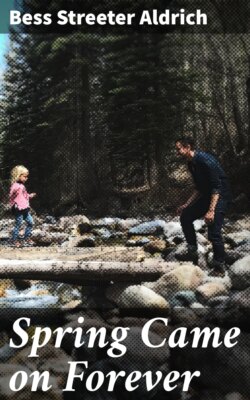Читать книгу Spring Came on Forever - Bess Streeter Aldrich - Страница 10
На сайте Литреса книга снята с продажи.
CHAPTER VIII
ОглавлениеTable of Contents
And now near the Iowa bluffs the overland travelers had broken camp for the last time before they were to sight the Missouri River.
Slowly the eleven wagons had crawled up and down the last of the unending Iowa trail. Ploddingly men had walked beside the oxen and cracked the long bull whips which circled over the stolid beasts' backs but never touched them. Patiently the women had sat in the covered wagons for all these weeks waiting this day of entering the new territory in which they were to make homes for their men. Most of them had come on the long trek against the desires of their hearts, for always the woman clings longer to the old hearth.
Young Mrs. Henry Gebhardt had given birth to a child on the way. Anna Rhodenbach had become betrothed to Adolph Kratz. Old Grandpa Schaffer, taken with summer complaint, had died and been buried in eastern Iowa.
But now the endless journey lay behind them,--with the worried forebodings of young Mrs. Henry Gebhardt, with the childhood of Anna Rhodenbach and Adolph Kratz, with the unbroken sleep of old Grandpa Schaffer beside the trail in eastern Iowa.
They were soon to see the Big Muddy. And although several days' journey lay beyond it, still it was the gateway to the new home.
Fritz was continually straining his eyes toward the west hoping to catch the first sight of the river. But Amalia turned often to look back along the trail where the other wagons of the train stretched out like the long lash of a whip.
"Always, Fritz, I foolishly look for the strange wagon or the lone rider. Sometimes I think I see it so plainly that I wonder if I am a little mad."
"There's the river way, too, Mollia. Some one of the men had a paper printed in the big town of Omaha many miles to the north. There it said river crafts come up from the towns to the south and unload their goods."
He unwittingly gave her renewed hope, against which she strove to turn, fearful that it might buoy her up too much and make her suffering more keen when it should come to naught.
And then suddenly from the top of a rise they saw it,--the River! Almost simultaneously some one ahead had shouted back the news. And soon others behind were shouting, too. There it was ahead of them,--the Big Muddy, its waters tawny with the clay of its high banks,--rolling on to its union with the Father of Waters. On the far side,--the Nebraska Territory.
They could see cabins across the wide expanse of water. Nebraska City that was,--cabins and shacks in a sheltering cluster of trees, and a ferry-boat which must be summoned from the far side.
Wilhelm Stoltz, as master, was to go across first with his wagon and the heavy mares whose shaggy legs were like pillars.
There was the long wait, and then: "Come, Amalia," he called loudly. "We go now. You are the first woman of our people to cross. It is good luck for you. Good luck to meet Herman there, too, huh?" He repeated "Gutes Glück" many times. He was jovial, excited that the Nebraska Territory was in sight,--had almost forgotten his daughter's foolish idea that she had liked the young foundryman. Verrückt, she had been.
The ferry came over, so very slowly. But it did not come too slowly for Amalia. Rather she would have waited here on the Iowa side, prolonged the time before she must meet Herman who might even now be among those people over there on the levee.
They were down on the platform-like boat now, Amalia and her father and the one covered wagon with the shaggy-haired team. So many trips it would take to get all the colony across the river. Fritz must stay on the Iowa side with the other wagon, awaiting his turn.
They were crossing the muddy water now with that feeling of being too close to the dark turbulent waves. Amalia looked down at the turbid waters. They were thick, impenetrable. One could not see one inch beyond the muddy surface. Nor one hour into the future of one's life.
The coming of the ferry-boat had brought a scattering group of people down to the dock. From shore came a confused noise of laughter, braying stock, rumbling wagons, and the pounding of hammers far up on the hill. The wind was blowing hard on the river and Amalia with one hand held to her sunbonnet which rattled starchily in the breeze,--with the other she clutched a hard bundle of unbleached muslin.
The ferry-boat docked with a rattle of chains and the crowd idling about the wharf, pressed forward.
"Prettiest gal I've seen yet. She can have me, Pete," Amalia plainly heard an uncouth tobacco-stained individual say.
"Sst! Careful!" his companion idler whispered. "This here fellow comin' is lookin' for her."
